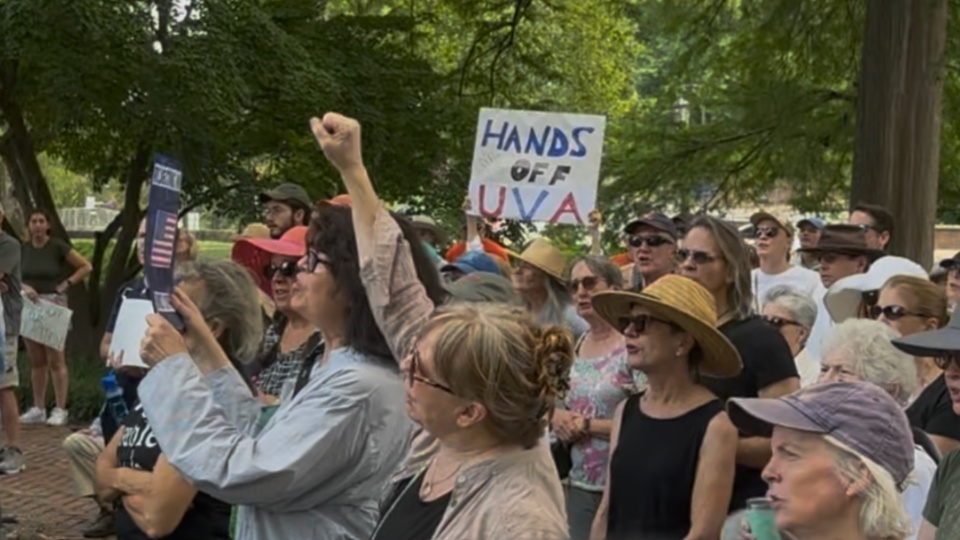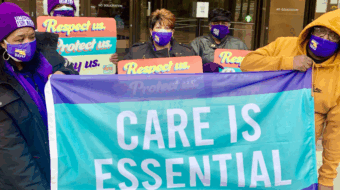
On June 27, 2025, University of Virginia President Jim Ryan resigned after Trump’s Department of Justice pressured the college to dump him in order to resolve a federal investigation into its Diversity, Equity, and Inclusion (DEI) programs.
Ryan’s forced departure is the latest in a wave of reactionary interventions in higher education carried out under the Trump administration as part of a broader effort to transform universities from sites of critical inquiry into training grounds focused on propaganda and obedience. This is not just an administrative overreach; it’s also a component in a class war being waged against students and workers.
DEI programs are more than symbolic gestures; for many marginalized students, they represent one of the only institutional footholds for identifying and counteracting systemic harm, building community, and organizing. That on its own makes them dangerous to a regime that seeks to reassert unchallenged white supremacy, cis-heteronormativity, patriarchy, and other forms of systemic oppression.
The purge of Ryan is only an opening move. What’s under attack is the very idea that universities can serve as spaces of dissent, intellectual freedom, and collective struggle. The end goal is not just compliance but conquest, which seeks to turn universities into spaces that are ideologically and politically captured by the far-right’s political project, and more broadly, the interests of capital.
In his resignation letter, Ryan wrote:
“To make a long story short, I am inclined to fight for what I believe in, and I believe deeply in this University, but I cannot make a unilateral decision to fight the federal government in order to save my own job. To do so would not only be quixotic but appear selfish and self-centered to the hundreds of employees who would lose their jobs, the researchers who would lose their funding, and the hundreds of students who could lose financial aid or have their visas withheld.”
His resignation is framed as an act of responsibility or care when it is anything but; it reflects the limits of liberal institutionalism in the face of a growing authoritarian power. The meaning of this is clear: When forced to choose between defending the University of Virginia community and compliance, leadership will choose compliance. Not because they align with the Trump regime’s project, but because they are structurally bound to preserve the institution at any cost, even if that means abandoning the people within it.
The targeting of UVA is not unique, but part of a broader country-wide effort by the right to bring universities into alignment with the interests of capital and the state. Under Trump, the federal government has escalated its assault on higher education using investigations, funding cuts, and political pressure to dismantle what remains of its opposition in academia.
From attacks against critical race theory and trans sports to bans on pro-Palestine protests and DEI programs, the target of this reactionary project is clear: any space that enables critique, community, or organizing. This is not just about silencing a handful of administrators; it is about transforming universities from a contested space into a fully captured one where knowledge is subordinated to the the far-right’s fascist project.
Despite the institutional retreat by UVA, the response from workers, students, and community members has been quite different. They’ve shown that this overreach by the federal government will be resisted. Dozens of students, alumni, faculty, and community members gathered spontaneously to protest Ryan’s resignation immediately after it was announced, and another demonstration was organized on July 4 by Uprise! Creative Collective C’ville and Indivisible Charlottesville.
The United Campus Workers of Virginia (UCWVA) issued a statement condemning the “federal authoritarianism and interference” that engineered Ryan’s ousting. The union called for democratic governance of the university by university workers and students and rejected the idea that UVA belongs to political appointees or federal authorities.
Similarly, the Wahoos4UVA, a student, alumni, and community organization at UVA, warned that the DOJ’s actions represent a partisan attack on higher education, threatening the university’s core values. Both statements speak to what this moment demands—organized collective resistance from those who really make the university run.
What happened at UVA is not about just one resignation; it’s a sign of what’s to come. The university is being reshaped stripped of its potential as a site for dissent. However, as the UCWVA and other organizations make clear, the attack is not going unanswered. The future of UVA, and universities across the country, depends on students, workers, and community members organizing, building people’s power, and fighting back against the far-right Trump administration’s reactionary project.
As with all op-eds published by People’s World, the views reflected here are those of the author.
We hope you appreciated this article. At People’s World, we believe news and information should be free and accessible to all, but we need your help. Our journalism is free of corporate influence and paywalls because we are totally reader-supported. Only you, our readers and supporters, make this possible. If you enjoy reading People’s World and the stories we bring you, please support our work by donating or becoming a monthly sustainer today. Thank you!










